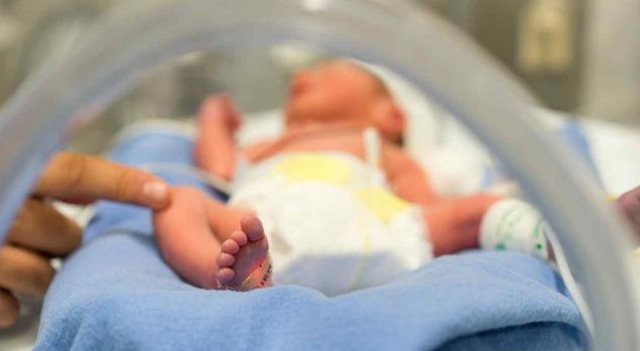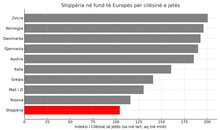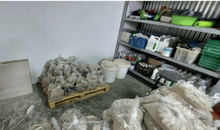
 Flash News
Flash News
Gunfire in Durres, a 30-year-old man is injured
Accident on Arbri Street, car goes off the road, two injured
Arrests of "Bankers Petrolium", Prosecution provides details: Exported and sold 532 billion lek of oil, caused millions of euros in damage to the state
Ndahet nga jeta tragjikisht në moshën 28-vjeçare ylli i Liverpool, Diogo Jota
Posta e mëngjesit/ Me 2 rreshta: Çfarë pati rëndësi dje në Shqipëri

The number of babies born in our country is experiencing a drastic decline from year to year, reflecting the deterioration of demographic indicators and social and economic conditions in the country.
Official INSTAT data published today show that during 2024, only 22,425 babies were born in our country, or 5 percent less than in 2023. The decline in births deepened further last year compared to 2023 when births fell by 4.3%.
In 2024, only 22,425 babies were born nationwide, the lowest level since 1934 when official annual data was reported.
Data shows that even during World War II, more births were recorded in Albania than today. For example, in 1942, over 36,000 babies were born at a time when the number of women of reproductive age was lower than today.
In 1950, when the communist dictatorship regime was established, 47,291 babies were born, according to data from INSTAT archives, while the number of women of reproductive age (15-49 years old) was only 259,472 thousand.
Last year, just over 22,000 babies were born, while the number of women of reproductive age was almost twice as high as in the 1950s.
Demographers and sociologists are concerned that birth rates in Albania have fallen beyond all predictions.
Experts claim that the policy is long overdue to implement a set of measures, which should focus on curbing immigration and identifying means that can help young couples have children.
They suggest interventions to improve the economic situation of young families. The dermographers claim that a detailed examination of the needs of young families by region is needed and then a package of policies should be designed to help them with the costs of raising children.
Despite economic and social changes, Albanian society still preserves the values of tradition and family. Albanian women still want to have more children than they have.
Six years ago, women were asked what the ideal number of children they would like to have in their lifetime was. The results showed that 100 women wanted to have at least 250 children, a figure higher than the replacement rate that ensures natural population growth.
In fact, these women had far fewer children than they had in their ideal. Six years after the survey, 100 women of reproductive age had given birth to just 121 children, not even half of what they considered ideal in 2018.
The practices of other countries, which have experienced declining fertility rates before us, show that the most effective tool was supporting young married families.
In 2003, Spain adopted a birth-boosting reform in which working mothers with children under three years old were exempted from personal income tax. Tax breaks were extended to mothers who gave birth to more children. A baby bonus of 2,500 euros was also given for each birth./Monitor
Latest news










Greece imposes fee to visit Santorini, how many euros tourists must pay
2025-07-03 20:50:37
Don't make fun of the highlanders, Elisa!
2025-07-03 20:43:43
Gunfire in Durres, a 30-year-old man is injured
2025-07-03 20:30:52

The recount in Fier cast doubt on the integrity of the vote
2025-07-03 20:09:03




Heatwave has left at least 9 dead this week in Europe
2025-07-03 19:00:01

Oil exploitation, Bankers accused of 20-year fraud scheme
2025-07-03 18:33:52
Three drinks that make you sweat less in the summer
2025-07-03 18:19:35
What we know so far about the deaths of Diogo Jota and his brother André Silva
2025-07-03 18:01:56



Another heat wave is expected to grip Europe
2025-07-03 17:10:58

Accident on Arbri Street, car goes off the road, two injured
2025-07-03 16:45:27

Accused of two murders, England says "NO" to Ilirjan Zeqaj's extradition
2025-07-03 16:25:05





Gaza rescue teams: Israeli forces killed 25 people, 12 in shelters
2025-07-03 15:08:43
Diddy's trial ends, producer denied bail
2025-07-03 15:02:41

Agricultural production costs are rising rapidly, 4.8% in 2024
2025-07-03 14:55:13
Warning signs of poor blood circulation
2025-07-03 14:49:47
Croatia recommends its citizens not to travel to Serbia
2025-07-03 14:31:19
Berisha: Albania is the blackest stain in Europe for the export of emigrants
2025-07-03 14:20:19


'Ministry of Smoke': Activists Blame Government for Wasteland Fires
2025-07-03 13:59:09

AFF message of condolences for the tragic loss of Diogo Jota and his brother
2025-07-03 13:41:36
Five healthy foods you should add to your diet
2025-07-03 13:30:19






A unique summer season, full of rhythm and rewards for Credins bank customers!
2025-07-03 12:12:20

Fire situation in the country, 29 fires reported in 24 hours
2025-07-03 12:00:04
The constitution of the Kosovo Assembly fails for the 41st time
2025-07-03 11:59:57
The gendering of politics
2025-07-03 11:48:36

The price we pay after the "elections"
2025-07-03 11:25:39

Xhafa: The fire at the Elbasan landfill was deliberately lit to destroy evidence
2025-07-03 11:08:43

The 3 zodiac signs that will have financial growth during July
2025-07-03 10:48:01
Democratic MP talks about the incinerator, Spiropali turns off her microphone
2025-07-03 10:39:24

Ndahet nga jeta tragjikisht në moshën 28-vjeçare ylli i Liverpool, Diogo Jota
2025-07-03 10:21:03
Cocaine trafficking network in Greece, including Albanians, uncovered
2025-07-03 10:10:12



Korreshi: Election manipulation began long before the voting date
2025-07-03 09:39:13
Arrest of Greek customs officer 'paralyzes' vehicle traffic at Qafë Botë
2025-07-03 09:28:41
After Tirana and Fier, the boxes are opened in Durrës today
2025-07-03 09:21:10
Enea Mihaj transfers to the USA, will play as an opponent of Messi and Uzun
2025-07-03 09:10:04

Foreign exchange, the rate at which foreign currencies are sold and bought
2025-07-03 08:53:50
Index, Albania has the worst quality of life in Europe
2025-07-03 08:48:10


Horoscope, what do the stars have in store for you today?
2025-07-03 08:17:05
Clear weather and high temperatures, here's the forecast for this Thursday
2025-07-03 08:00:37
Posta e mëngjesit/ Me 2 rreshta: Çfarë pati rëndësi dje në Shqipëri
2025-07-03 07:46:48



Lufta në Gaza/ Pse Netanyahu do vetëm një armëpushim 60-ditor, jo të përhershëm?
2025-07-02 21:56:08
US suspends some military aid to Ukraine
2025-07-02 21:40:55



Methadone shortage, users return to heroin: We steal to buy it
2025-07-02 20:57:35
Government enters oil market, Rama: New price for consumers
2025-07-02 20:43:30
WHO calls for 50% price hike for tobacco, alcohol and sugary drinks
2025-07-02 20:41:53



